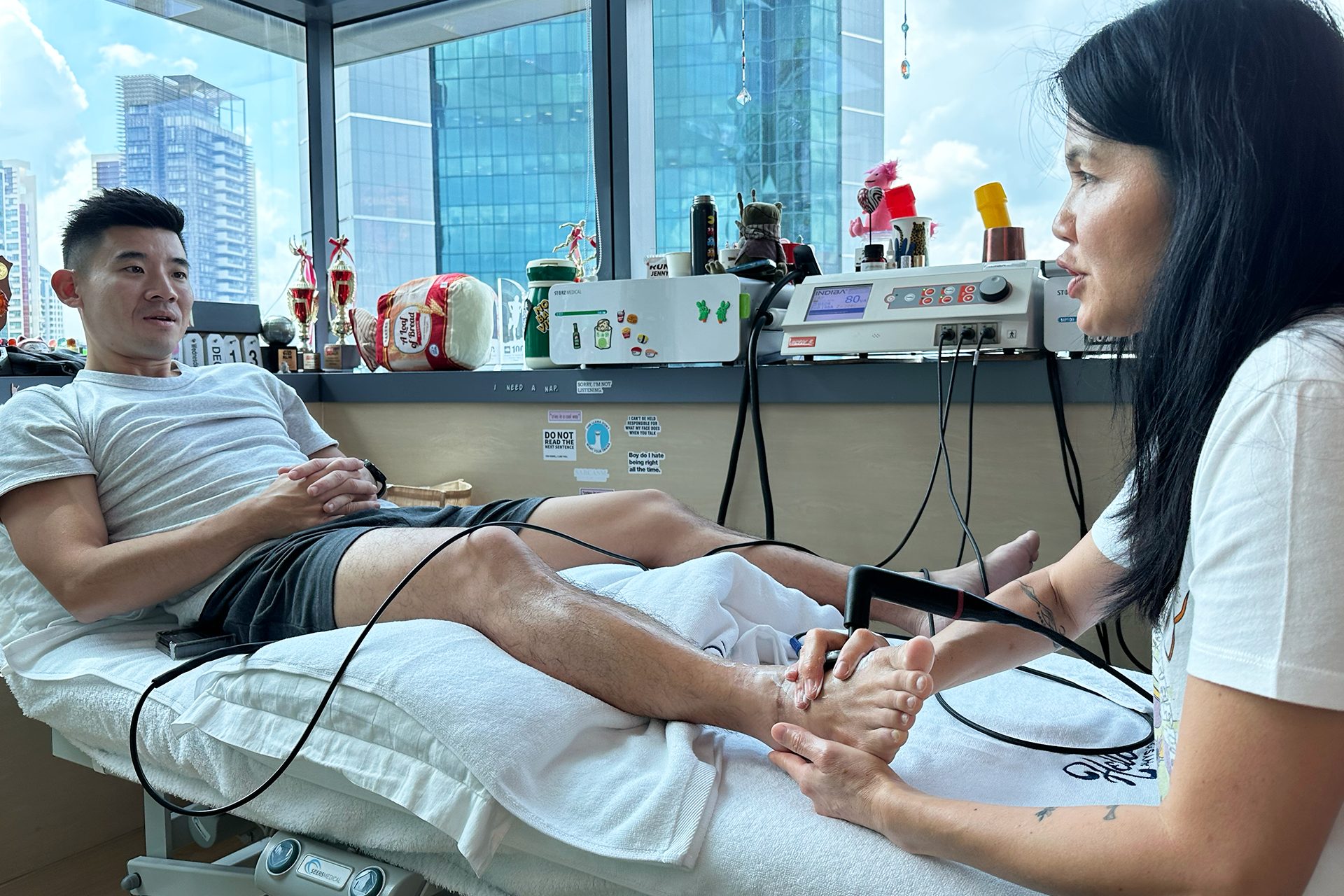Physical Therapy for Tarsal Tunnel Syndrome
For Tarsal Tunnel Syndrome, a range of conservative treatments is utilized, including immobilization techniques to relieve pressure on the tibial nerve and associated pain symptom relief.
At HelloPhysio, our approach to Tarsal Tunnel Syndrome is comprehensive. Our expert multidisciplinary team considers every factor contributing to the condition, such as lifestyle, exercise habits, and individual recovery capabilities. We provide specialized manual therapy, adjunctive therapies, and prescriptive exercise programs designed to relieve symptoms effectively and restore mobility.
Our therapeutic strategies synergistically improve mobility and muscular strength, specifically targeting the reduction of pressure on the tibial nerve to lessen the likelihood of symptom recurrence. This integrated method ensures a more successful and sustained recovery.
Treatments targeting different aspects of the condition are essential to resolve Tarsal Tunnel Syndrome effectively. Here’s how our integrated therapies tackle the condition’s complex mechanisms to restore function, reduce pain, and prevent recurrence.
INDIBA® Activ increases local blood flow within the tarsal tunnel, ensuring that the affected nerve and surrounding tissues receive sufficient oxygen and nutrients. This is crucial for reducing inflammation and edema that contribute to nerve compression. This activation aids in repairing damaged cells and promotes healthy tissue regeneration, directly addressing the degenerative changes that can exacerbate the dysfunction.
Shockwave Therapy targets the affected area, releasing dysfunctional connective tissue within the tarsal tunnel. The acoustic waves break down adhesions and scar tissue that contribute to nerve compression, thereby alleviating pressure on the tibial nerve to restore function and reduce pain.
Extracorporeal Magnetotransduction Therapy (EMTT) with MAGNETOLITH® works to regenerate damaged nerve fibers within the tarsal tunnel utilizing magnetic fields. Magnetic therapy promotes cellular growth and repair processes, which are important for nerve healing and function restoration. It helps address the nerve damage inherent in the disorder, encouraging the recovery of healthy nerve tissue and improving neurological function.
Neuromuscular manual therapy focuses on muscular and connective tissue dysfunctions, including the tendons from the knee down to the foot. The therapy corrects muscular and connective tissue imbalances and alleviates strain on the tarsal tunnel, exacerbating the compression of the tibial nerve.
Further, specific prescribed exercises aim to strengthen the muscles around the ankle and improve the foot’s arch stability. Strengthening these areas can help offload pressure from the tarsal tunnel, reducing compression on the posterior tibial nerve.
Book an Appointment
Exploring the Mechanism of Tarsal Tunnel Syndrome
The primary issue and underlying cause of Tarsal Tunnel Syndrome is the compression of the posterior tibial nerve. This compression can be due to various factors, including inflammation, structural anomalies, or direct trauma. The pressure interrupts normal nerve conduction, leading to symptoms such as pain, tingling, and numbness along the nerve’s pathway.
Scar tissue can develop following injury or surgery in the tarsal tunnel area. Being less flexible than healthy tissue, scar tissue can increase pressure within the tarsal tunnel, exacerbating nerve compression, which makes physical therapy for Tarsal Tunnel Syndrome even more important.
Further complicating matters, compression within the tarsal tunnel can irritate the nerve and disrupt its normal function, leading to pain, tingling and numbness. In some cases, compression may also limit blood flow to the nerve, potentially hindering the healing process. Research suggests that red light therapy is promising for improving circulation, supporting nerve regeneration and reducing inflammation.
Additionally, the fascia surrounding the muscles and structures within the tarsal tunnel can become restricted due to injury, overuse, or postural imbalances. These restrictions can alter the normal biomechanics of the foot and ankle and contribute to posterior tibial nerve compression.
Chronic nerve compression can also lead to biochemical changes within the nerve tissue. These changes can affect the nerve’s ability to transmit signals correctly, leading to increased sensitivity to pain, alterations in sensation, and decreased motor function.
Considering these mechanisms and the causes of Tarsal Tunnel Syndrome, our physiotherapists can offer a comprehensive treatment plan addressing its root causes to promote optimal recovery and function.
Connect with Physiotherapists and Rehabilitation Team
HelloPhysio’s seasoned clinical health professionals are dedicated to guiding you through your rehabilitation of tarsal tunnel syndrome. Our senior physiotherapists and rehabilitation team are highly skilled in treating musculoskeletal dysfunctions, orthopedic disorders, acute conditions and sports injuries.
To discover more about our comprehensive treatment of tarsal tunnel syndrome treatment, contact or call our clinics to discuss or schedule a consultation with our team.

